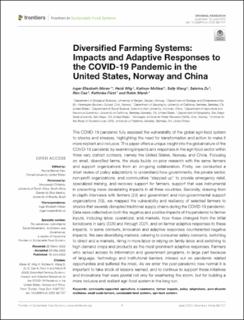Diversified Farming Systems: Impacts and Adaptive Responses to the COVID-19 Pandemic in the United States, Norway and China
Måren, Inger Elisabeth; Wiig, Heidi; McNeal, Kathryn; Wang, Sally; Zu, Sebrina; Cao, Ren; Fürst, Kathinka; Marsh, Robin
Journal article, Peer reviewed
Published version

Åpne
Permanent lenke
https://hdl.handle.net/11250/3004506Utgivelsesdato
2022Metadata
Vis full innførselSamlinger
- Department of Biological Sciences [2235]
- Registrations from Cristin [9791]
Sammendrag
The COVID-19 pandemic fully exposed the vulnerability of the global agri-food system to shocks and stresses, highlighting the need for transformation and action to make it more resilient and inclusive. This paper offers a unique insight into the global nature of the COVID-19 pandemic by examining impacts and responses in the agri-food sector within three very distinct contexts, namely the United States, Norway, and China. Focusing on small, diversified farms, the study builds on prior research with the same farmers and support organizations from an on-going collaboration. Firstly, we conducted a short review of policy adaptations to understand how governments, the private sector, non-profit organizations, and communities “stepped up” to provide emergency relief, specialized training, and recovery support for farmers, support that was instrumental in preventing more devastating impacts in all three countries. Secondly, drawing from in-depth interviews with farmers (23) and government and non-governmental support organizations (19), we mapped the vulnerability and resiliency of selected farmers to shocks that severely disrupted traditional supply chains during the COVID-19 pandemic. Data were collected on both the negative and positive impacts of the pandemic to farmer inputs, including labor, operations, and markets, how these changed from the initial lockdowns in early 2020 and through 2021, and on farmer adaptive responses to these impacts. In some contexts, innovation and adaptive responses counteracted negative impacts. We saw diversifying markets, catering to consumer safety concerns, switching to direct and e-markets, hiring in more labor or relying on family labor, and switching to high demand crops and products as the most prominent adaptive responses. Farmers who lacked access to information and government programs, in large part because of language, technology and institutional barriers, missed out on pandemic related opportunities and suffered the most. As we enter the post-pandemic new normal it is important to take stock of lessons learned, and to continue to support those initiatives and innovations that were pivotal not only for weathering the storm, but for building a more inclusive and resilient agri-food system in the long-run.
